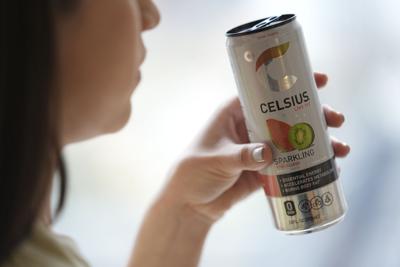Supermarket beverage aisles are starting to look a lot more like a pharmacy.

A can of Celsius, a fitness drink that is supposed to accelerate metabolism and burn body fat, is shown on Wednesday, April 10, 2024, in New York. The frenzy of functional beverages — drinks designed to do more than just taste good or hydrate — has grown into a multi-billion-dollar industry.
There are sodas made with mushrooms that supposedly improve mental clarity and juices packed with bacteria that claim to enhance digestive health. Water infused with collagen carries the promise of better skin, and energy drinks offer to help burn body fat.
Welcome to the frenzy of functional beverages — drinks designed to do more than just taste good or hydrate. What started in the late 1980s with caffeine- and vitamin-laced energy drinks like Red Bull has grown into a multi-billion-dollar industry. Hundreds of brands are vying for consumers’ attention with increasingly exotic ingredients and wellness-focused marketing.
Feeling stressed? Try a drink with ashwagandha, a shrub long used in herbal medicine. Want to enhance your workout? There are drinks containing chromium, a mineral that may boost metabolism. Want to get in a party mood without alcohol? Multiple companies are making non-alcoholic spirits and beers infused with ingredients like guayusa, a leaf containing caffeine and antioxidants.
Consumer intelligence company NielsenIQ counted 53,000 UPC symbols in the U.S. functional beverage category last year, including all of the different flavors of energy drinks, sports drinks, sodas, waters, shakes and teas that are sold on the premise of enhancing mental or physical health.
Nutritionists say the general trend of consumers seeking out healthier beverages is a good one. But experts also say people should be cautious and read ingredient labels, especially if they are pregnant, taking medication or have other health issues. And they should avoid empty calories and sugars that they're not going to burn off. A 16-ounce Monster energy drink has nearly as much sugar as a regular Coke, for example.
“Someone who’s running a marathon has different needs than someone who’s commuting to work,” said Martha Field, an assistant professor in the division of nutritional sciences at Cornell University.
The U.S. Food and Drug Administration regulates ingredients and requires drink labels to be truthful, and the Federal Trade Commission can step in if companies make false claims. In 2013, the FTC determined that Pom Wonderful pomegranate juice was deceptively advertised as clinically proven to treat, prevent or reduce the risk of heart disease and prostate cancer.
But functional beverage makers generally make less specific claims, and the science behind them is sometimes inconclusive. SkinTe, a sparkling tea, says it “supports skin hydration and elasticity” with 3,000 milligrams of collagen in a 12-ounce can. But last year, Harvard Medical School researchers said there’s not yet solid evidence that collagen drinks or supplements enhance skin, hair or nail growth.
Negative reactions can also happen. Panera Bread faces at least two lawsuits claiming its highly caffeinated Charged Lemonade led to the deaths of people with heart conditions.
“It’s important to remember that everything has the potential to be both toxic and safe, depending on the amounts. The dose makes the poison,” said Joe Zagorski, a toxicologist for the Center of Research on Ingredient Safety at Michigan State University. “Since it’s difficult to determine the amount of specific compounds in many of these beverages, it’s better to proceed cautiously than to over-consume.”
In some ways, there’s nothing new about humans seeking added benefits from their drinks. Ancient Egyptians and Romans sipped chamomile tea for its perceived healing effects. In 1935, a Japanese microbiologist introduced Yakult, a fermented milk drink now sold around the world as a way to improve gut health.
In the last half-century, beverages ranging from Ovaltine to wheatgrass juice had their moments as praised nutritional supplements. What's different now is social media, which allows the speedy spread of information about less familiar ingredients, Cornell's Field said.
Two of the latest to generate a buzz are adaptogens, which are plants and mushrooms that have been shown to help the body respond to stress and fatigue, and nootropics, which are natural or synthetic cognitive enhancers like caffeine, gingko and amino acids.
Trends ebb and flow within the category. U.S. sales of prebiotic and probiotic drinks more than tripled last year, while sales in the more mature kombucha category rose just 8 percent, according to data compiled by consulting firm AlixPartners.
“Consumer savviness on functionality of ingredients has really increased,” said Sherry Frey, vice president of wellness at NielsenIQ.
Durbin reported from Detroit. Dixon reported from London.


